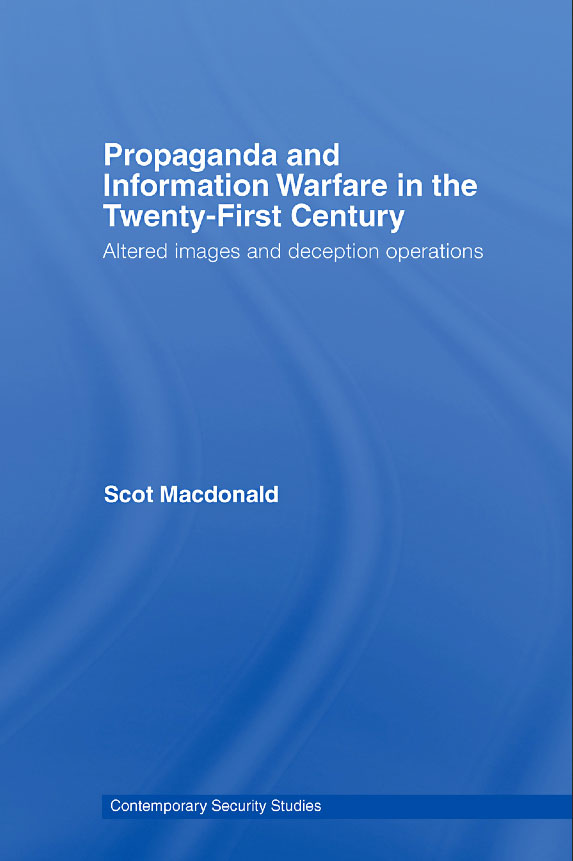Macdonald, Scot - Propaganda and Information Warfare in the Twenty-First Century: Altered Images and Deception Operations, [Hardcover] Oxon, UK, Routledge, 2007. ISBN10:0-415-77145-5
Reviewed by Majid Khan - RMIT University, Australia
It is an old phrase that a picture is a worth of over a thousand words but the new phrase is an altered image is worth of thousands of lies (deception). This and many thing related to propaganda, information warfare and different kind of deception operations are very well defined and explained Scot Macdonald’s Propaganda and Information Warfare in the Twenty-First Century. While it was published in 2007, the international event of the last few years warrants a closer examination of this book.
The book is divided into eleven cohesive chapters. Macdonald’s research attracts the attention of the readers interested in staging journalism, altered images, psychological warfare, deceptions in international relations and diplomacy and – indeed – the role of media in all these operations.
The early five chapters are all about the explanations – with historical examples – of information warfare including deceptions in psychological operations and how the media is being used effectively as a modern weapon of modern conflict. Chapters, six and seven, explore war deception – its principles and stratagems. In these chapters, Macdonald relies on past examples of conflicts to construct his scholarly argument.
Chapter eight examines the British achievement in War World II in the field of deceptions, something that seems to be quintessentially English. Macdonald beautifully sketched the most famous deception operation ‘Bodyguard’ by the British and it was efficiently planned and executed. He also described its leading role for the victory this conflict.
The remaining three chapters and conclusion look at the US. Scot Macdonald is of the view that Americans are far superior in all modern technologies and in warfare power but that does not mean they can’t be deceived by modern and perhaps less sophisticated enemies. It seems – when one looks at current events – the US is vulnerable in this regard.
Scot Macdonald holds a doctorate degree in international relations from University of South California and currently he is working there as Adjunct Professor. In the field of IR he is an expert in military interventions and writes articles in several publications about the US armed forces. Macdonald is a military expert and knows the importance of psychological operations in times of war and the entire book is full of examples of psychological operations. He points out that the US government can speak lie to any one if it is needed, stating that: ‘US laws have not caught up with the use of information as a weapon, let alone the use of manipulated images. Legally, the US government can lie to the American people, as well as to foreign audiences’ (155).
In the field of war of disinformation he gives a good example of the Iraq war and how the US media fabricated events in order to deceive its on people. He writes:
In 2003, for example, some 60 per cent of Americans surveyed believed at least one of three misconceptions about Iraq. The three invalid facts were that weapons of mass destruction (WMD) had been found in Iraq; that there was clear evidence that Hussein had worked with the 9/11 terrorists; and that people in other nations supported the war in Iraq or were closely divided in their support. In fact, no WMDs were found, Hussein had not collaborated with the 9/11 terrorists, and most nations opposed the war’ (134).
Some of the facts in the book need to be revised. The author writes that in Iraqi war, Americans were deceived by exile Iraqis, while actually it was its own war profiteers and the media deceived Americans. Macdonald also argues that Pakistan supported American invasion of Iraq. This is not correct. Pakistan never ever supported USA in Iraq war.
In a general overview of the book this looks like was written directly to the American authorities. He warns US authorities:
It is a certainty that such operations will be used against the United States in the future, since the weak have always used deception and propaganda against the strong and they now have the added weaponry of computer-aided manipulation of images and audio, and a global distribution network based on the Internet and the global media (180-181).
In the final chapters he gives good examples of how the enemy could deceive the US in future. To counter upcoming threats, he urges the US government to take steps in educating the people, arguing that:
Deception training should be required for personnel in the military, CIA, NSA and the State Department, and probably for all politicians who must make decisions based on information that may be deceptive or propaganda (182).
As mentioned it earlier, this is not a new release study. This study, however, has currency more than ever in the context of new international events shaping the world sphere and the way – as citizens – understand what is going on. This is a well-researched and enlightening work.
About the reviewer:
Majid Khan is a Pakistani journalist and lecturer of documentary production and journalism at National University of Modern Languages, in Islamabad. Majid holds a MA (Documentary) University of Bedfordshire, UK. He is a PhD candidate at RMIT University, in Melbourne, Australia.

